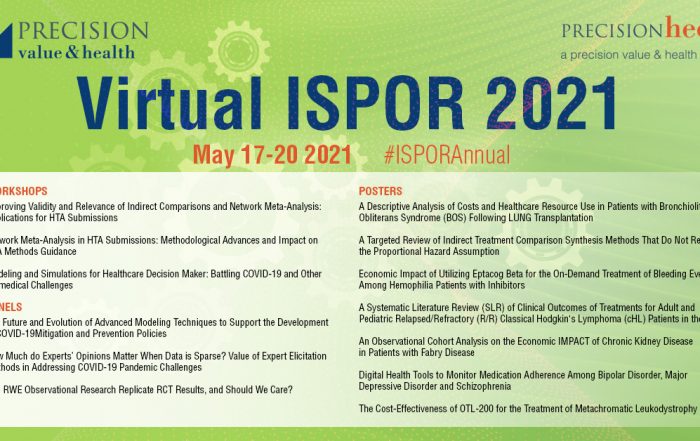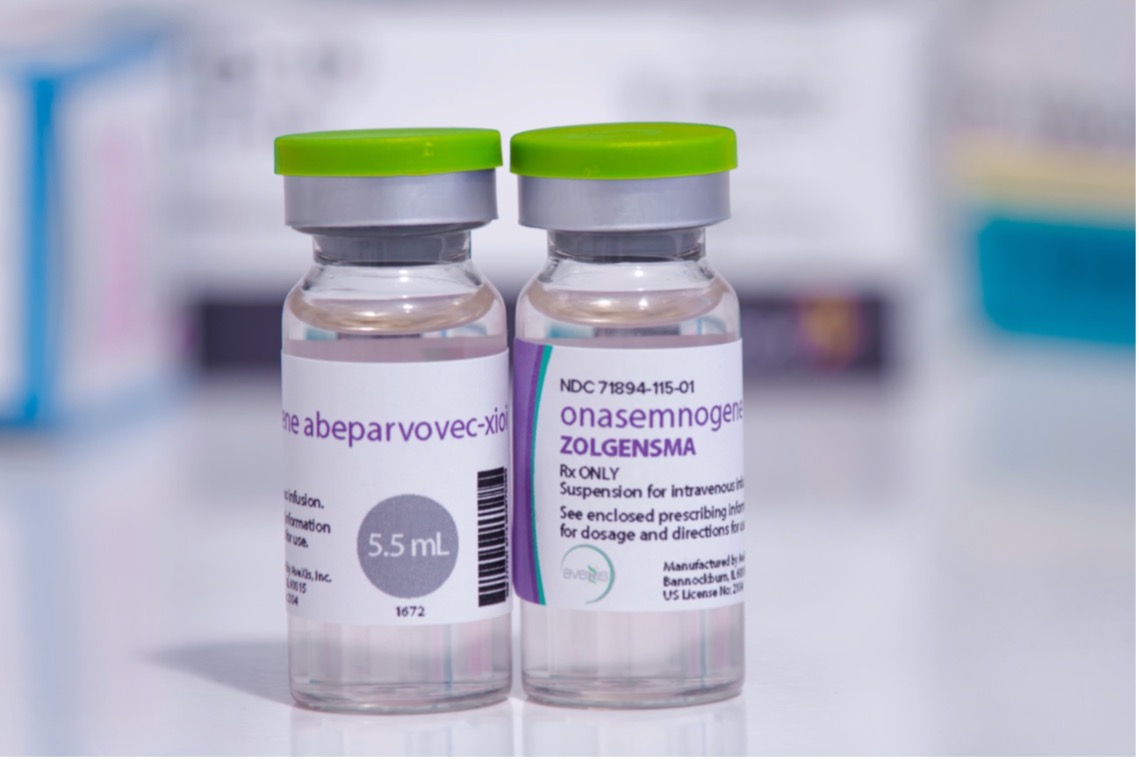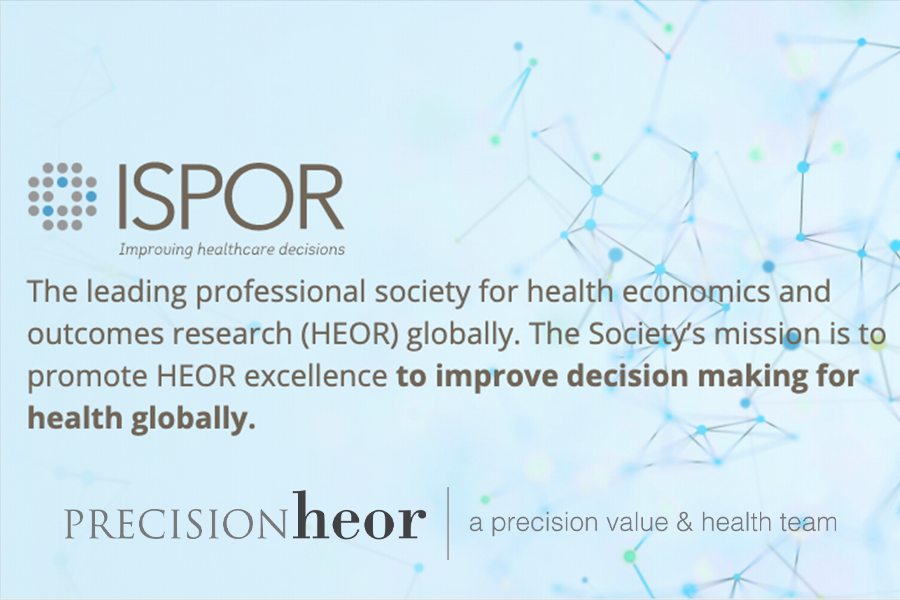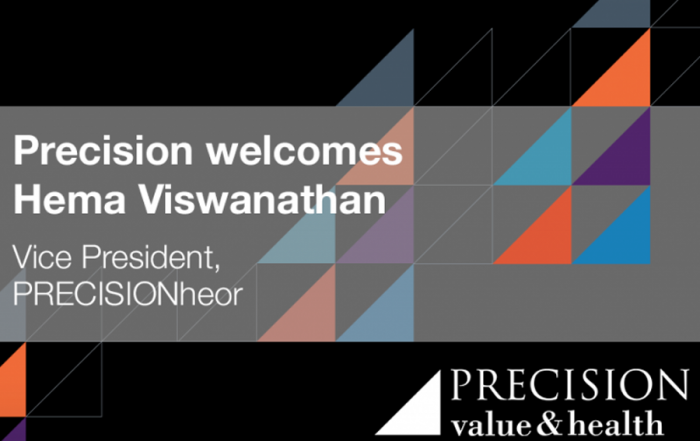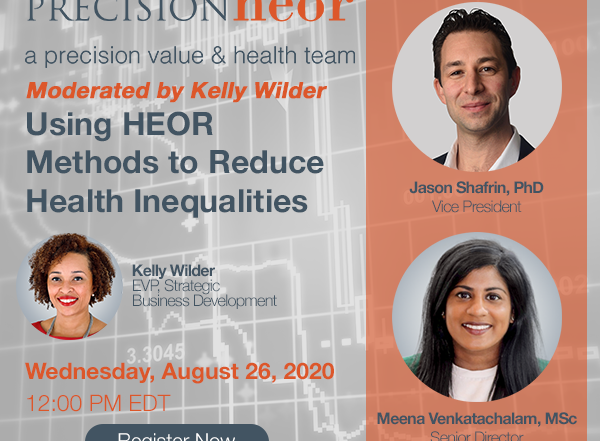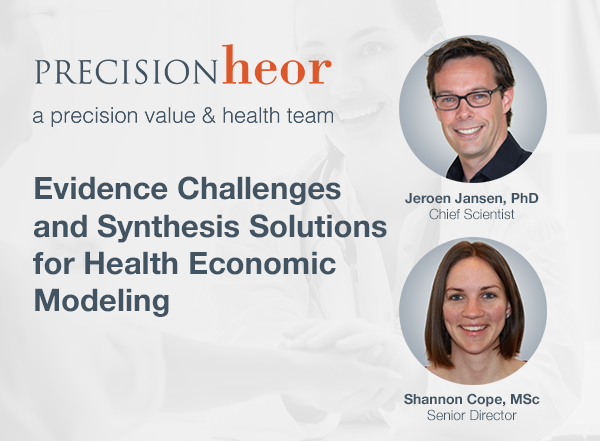Welcome back to High Leverage Outlier, PHE’s bimonthly newsletter. I’m Carolyn Harley, General Manager.
I’m Carolyn Harley, General Manager.In this edition, we’re excited to share some of our most recently published research and the accomplishments of our research staff. In addition, we have an informative Q&A with Darius Lakdawalla, our Chief Scientific Officer, and we’ll highlight our recent participation at AMCP, as well as our upcoming presence at ISPOR.
I hope you find High Leverage Outlier to be an informative and valuable resource. Of course, if you’d like to know more about any of the topics presented here, I encourage you to contact with me or a member of my team to discuss in greater detail.
| Carolyn Harley, PhD, MPA Senior Vice President and General Manager, PHE Carolyn.Harley@PrecisionHealthEconomics.com |
 |
Upcoming Events
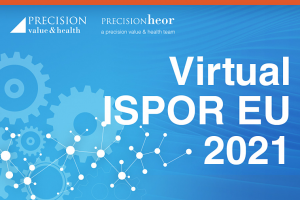
Conference: Virtual ISPOR EU 2021
Attending Virtual ISPOR EU 30 November to 3 December? PRECISIONheor is excited to be presenting nearly a dozen insightful posters and presentations. Click the link to download an overview of all the PRECISIONheor presentations, and check back on our website later this month to access full PDF downloads of the posters!
–

Endpoints Webinar: State of the Union for Advanced Medicines
Tune in as our panel of experts discusses the current state of the regenerative medicine and advanced therapies sector and the future of advanced medicines, including innovations in research and development going from treating rare diseases to prevalent conditions, continued investor confidence, and next-generation technologies. “State of the Union for Advanced Medicines,” December 8 at 12:00 PM EDT.
–

Upcoming Webinar: Cost-Effectiveness Analysis with R? A Discussion
Join us on December 15 for this insightful webinar featuring PRECISIONheor’s Jeroen Jansen, PhD, exploring the pros and cons of R versus Excel and the acceptability of R by HTA agencies. This webinar will be invaluable to those involved in preparing HTA submissions and in early health economic modeling as part of drug development decision-making.
–
If You Missed These the First Time Around, Here’s the Link
 On-Demand Webinar: Cutting Edge Conversations
On-Demand Webinar: Cutting Edge Conversations
PRECISIONheor’s Sajjad Raza, MD, PhD, MSM, joined HealthEconomics.com Editor-in-Chief Patti Peeples, PhD, RPh, for a presentation and panel discussion focused on biotech market access and the importance of early evidence development in commercial success. Watch on-demand now!
–
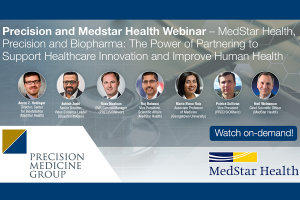 On-Demand Webinar: The Power of Partnering to Support Healthcare Innovation and Improve Human Health
On-Demand Webinar: The Power of Partnering to Support Healthcare Innovation and Improve Human Health
Did you miss our recent webinar in partnership with MedStar Health, a nationally recognized leader in the integration and application of real-world data analytics? Watch it on-demand now! This webinar was moderated by PRECISIONheor’s Ross Maclean, MD, and featured MedStar Health’s Neil Weissman, MD, who joined a panel of experts from Precision and MedStar. The discussion focused on the potential of cross-industry collaborations to support evidence generation for life sciences companies that will, in turn, advance medical care and health outcomes, and drive biopharma innovation.
–
Recent Thought Leadership
Quantitative studies are the gold standard for establishing causality and drawing conclusions that can be generalized beyond the population studied. However, quantitative research methods also often lack contextual considerations and perspectives that can be further informed by qualitative approaches. Precision’s Marlon Graf, PhD, Rifat Tuly, MPH, and Suepattra May-Slater, MPH, PhD, argue that evidence generated through a mixed methods approach of both quantitative and qualitative research methods is the best approach to addressing complexity in healthcare innovation and care delivery.
–

We have compiled some of the important work PRECISIONheor experts have recently contributed to in the rare disease space. Click here to download our free interactive PDF to learn more about some of these impactful studies in modeling, evidence synthesis, and other critical topics.
–

Recently, the National Institute for Health and Care Excellence (NICE) published a detailed strategy plan outlining its vision for the next 5 years. Ross Maclean provides some key takeaways to life science innovators that help frame how NICE’s strategic framework may impact their business. Watch the video here and click here to download the summary.
–
–
Staff Feature
This month PRECISIONheor would like to highlight the work and expertise of Senior Director Steve Sison, MS.
Steve specializes in:
- Analytic programming, methodology, and best practices
- Knowledge, feasibility assessment, and use of retrospective healthcare real-world data (RWD) in HEOR research, including administrative claims, electronic medical records, public health survey and registry data, international healthcare data sources, medical coding ontologies
- Data management (extract, transformation, and loading) and governance (data access usage agreements and compliance)
Steve recently co-authored 2 insightful publications, including:
- Effect of discontinuing nebulizer maintenance bronchodilator therapy during the COVID-19 pandemic: A retrospective cohort study of elderly COPD patients residing in long-term care facilities
- During the COVID-19 pandemic, there is a heightened concern of SARS-CoV-2 transmission among patients on nebulizers, causing some health care providers to discontinue nebulized maintenance therapy with long-acting bronchodilators among patients with COPD in long-term care (LTC) facilities. The study objective was to compare health outcomes between patients with COPD who discontinued nebulizer maintenance therapy versus those who did not.
- US national payers analysis of the incremental healthcare burden among patients with treatment-resistant depression
- Treatment-resistant depression (TRD) affects an estimated 20 to 30% of patients with major depressive disorder (MDD) and represents a critical unmet need in the management of the disease. This study compared the healthcare burden of patients with TRD versus non-TRD MDD covered by Commercial, Medicaid, and Medicare health plans.
To speak with Steve directly, contact him at steve.sison@precisionvh.com.
Upcoming Events
Scientist.com presents: Cutting Edge Conversations
On September 21st @ 11:00am EDT, PRECISIONheor’s Sajjad Raza and Naomi Sacks will join HealthEconomics.com’s Editor-in-Chief Patti Peeples for a presentation and panel discussion focused on biotech market access and the importance of early evidence development in commercial success. Don’t miss this live event!
–
If You Missed These the First Time Around, Here’s the Link

Oncology Care in a Value-Based World
The shift from fee-for-service to value-based care has been undeniably gaining momentum over the past few years. However, 2020 brought an incredible influx of factors that were not previously accounted for. Join our Precision Value & Health colleagues Stephanie Kennedy of PRECISIONadvisors, Janet Serluco of PRECISIONvalue, and Matt Pitzel of PRECISIONxtract, on Wednesday, May 19 at 1:00 PM ET, for this collaborative webinar exploring the results of our proprietary survey on the challenges and opportunities facing value-based oncology care.
–

The Future of Reimbursement for Cell and Gene Therapies
Join us Tuesday, June 22, at 4:00 PM ET for The Future of Reimbursement for Cell and Gene Therapies, where payer representatives from the UK and Germany and an industry representative will discuss how payers will respond to the changing cell and gene therapies landscape, and how manufacturers can proactively mitigate their strategies. Moderated by PRECISIONadvisor’s Richard Macaulay, this unique webinar will expand the discussion of cell and gene therapies as presented by Richard at World EPA Congress.
–

In general, health decision modeling methods widely evaluate the role of drug technology or intervention, from its impact on patient’s quality of life, to consequences on societal and healthcare economics. Moderated by Ross Maclean, join Anuj Mubayi on Wednesday, June 30 at 1:00 PM ET, as we discuss the main challenges confronting modeling approaches and analysis, and how the COVID-19 pandemic has shifted the global discussion on health decision analysis tools for new coronavirus-related health problems.
–
–
Recent Thought Leadership

Despite the strengths and historical dominance of quantitative research in the health care domain, the importance of rigorous qualitative research as both a complement to, and a mechanism for, augmenting quantitative methods is increasingly being recognized and used across health-related disciplines. PRECISIONheor’s Suepattra May-Slater, Meaghan Roach and Richard Murphy explain why it’s essential to augment the hard data from quantitative research with the patient-related soft data generated from qualitative research.
–

What does it mean to be patient-centered in health economics?
Drug pricing has become a hot-button issue in recent years in the US. Reducing health care spending, and pharmaceutical spending in particular, is one of the few areas of bipartisan agreement in a time of increasingly divisive bipartisanship. A popular argument is the notion of aligning prices with value, and so “cost-effectiveness models,” a fairly wonky concept, has entered the mainstream lexicon. Jacki Chou discusses the juxtaposition between cost-effective care and patient-centered care, as approaches in health economics begin to shift.
–

PRECISIONheor’s Featured CNS/Neuro Publications
We have compiled some of the important work PRECISIONheor experts have recently contributed to in the CNS/Neuro space. Click here to download our free, interactive PDF to learn more about some of these impactful studies in modeling, evidence synthesis, and other critical topics.
–
–
Featured Study
 Societal Costs of Schizophrenia & Related Disorders
Societal Costs of Schizophrenia & Related Disorders
PRECISIONheor’s Kyi-Sin Than, Kelly Birch, Jacki Chou, Jim Baumgardner, and Kenneth Ching collaborated with the Schizophrenia & Psychosis Action Alliance (S&PAA) on this recently released report, highlighting the staggering costs of schizophrenia in the United States, and underscoring areas where current systems can significantly improve care for those living with schizophrenia. With early diagnosis and comprehensive, holistic treatment, individuals with schizophrenia can live successful and fulfilling lives. PRECISIONheor and S&PAA hope that this report will serve as a catalyst for vital policy change to shift the treatment paradigm and improve the lives of individuals with schizophrenia and their loved ones.
–
PRECISIONheor at Virtual ISPOR 2021
Attending Virtual ISPOR 2021 May 17-20? Don’t miss any of the PRECISIONheor panels, workshops, and posters being presented throughout the conference:
Prerelease:
- Issue Panel: The Future and Evolution of Advanced Modeling Techniques to Support the Development of COVID-19 Mitigation and Prevention Policies
- Issue Panel: Can RWE Observational Research Replicate RCT Results, and Should We Care?
- Workshop: Improving Validity and Relevance of Indirect Comparisons and Network Meta-Analysis: Implications for HTA Submissions
- Workshop: Modeling and Simulations for Healthcare Decision Maker: Battling COVID-19 and Other Biomedical Challenges
Monday, May 17:
- Poster: A Descriptive Analysis of Costs and Healthcare Resource Use in Patients with Bronchiolitis Obliterans Syndrome (BOS) Following LUNG Transplantation
- Poster: Economic Impact of Utilizing Eptacog Beta for the on-Demand Treatment of Bleeding Events Among Hemophilia Patients with Inhibitors
- Poster: A Targeted Review of Indirect Treatment Comparison Synthesis Methods That Do Not Rely on the Proportional Hazard Assumption
Tuesday, May 18:
- Workshop: Network Meta-Analysis in HTA Submissions: Methodological Advances and Impact on HTA Methods Guidance
- Poster: A Systematic Literature Review (SLR) of Clinical Outcomes of Treatments for Adult and Pediatric Relapsed/Refractory (R/R) Classical Hodgkin’s Lymphoma (cHL) Patients in the UK
Wednesday, May 19:
- Poster: Digital Health Tools to Monitor Medication Adherence Among Bipolar Disorder, Major Depressive Disorder and Schizophrenia
- Poster: The Cost-Effectiveness of OTL-200 for the Treatment of Metachromatic Leukodystrophy (MLD)
- Poster: An Observational Cohort Analysis on the Economic IMPACT of Chronic Kidney Disease in Patients with Fabry Disease
Thursday, May 20:
- Issue Panel: How Much Do Experts’ Opinions Matter When Data Is Sparse? Value of Expert Elicitation Methods in Addressing COVID-19 Pandemic Challenges
For more information about the PRECISIONheor panels, workshops and posters, click here!
Upcoming Webinars

Oncology Care in a Value-Based World
The shift from fee-for-service to value-based care has been undeniably gaining momentum over the past few years. However, 2020 brought an incredible influx of factors that were not previously accounted for. Join our Precision Value & Health colleagues Stephanie Kennedy of PRECISIONadvisors, Janet Serluco of PRECISIONvalue, and Matt Pitzel of PRECISIONxtract, on Wednesday, May 19 at 1:00 PM ET, for this collaborative webinar exploring the results of our proprietary survey on the challenges and opportunities facing value-based oncology care.
–

The Future of Reimbursement for Cell and Gene Therapies
Join us Tuesday, June 22, at 4:00 PM ET for The Future of Reimbursement for Cell and Gene Therapies, where payer representatives from the UK and Germany and an industry representative will discuss how payers will respond to the changing cell and gene therapies landscape, and how manufacturers can proactively mitigate their strategies. Moderated by PRECISIONadvisor’s Richard Macaulay, this unique webinar will expand the discussion of cell and gene therapies as presented by Richard at World EPA Congress.
–

In general, health decision modeling methods widely evaluate the role of drug technology or intervention, from its impact on patient’s quality of life, to consequences on societal and healthcare economics. Moderated by Ross Maclean, join Anuj Mubayi on Wednesday, June 30 at 1:00 PM ET, as we discuss the main challenges confronting modeling approaches and analysis, and how the COVID-19 pandemic has shifted the global discussion on health decision analysis tools for new coronavirus-related health problems.
–
–
If you missed these the first time around, follow the links to some past work

Thought Leadership: CGRPs for Migraine Play Role in Value-Based Contracting
Despite a slew of new branded therapies for acute migraine treatment and migraine prevention, many of which target calcitonin gene-related peptide (CGRP) receptors, drug benefits experts say that health plans and PBMs continue to rely mainly on generic triptans for acute migraine treatment and generic beta-blockers, antiepileptics, and tricyclic antidepressants for migraine prevention. Precision’s Jacki Chou joins an expert discussion about developing patient-specific migraine treatment plans and the potential growth of value-based therapies.
––
In X-linked myotubular myopathy (XLMTM), mutations in the MTM1 gene result in absence or dysfunction of myotubularin, a protein required for normal development, maintenance, and function of skeletal muscle. Extreme muscle weakness results in severe respiratory failure that is fatal for approximately half of XLMTM-affected children by age 18 months. Most surviving patients require invasive mechanical assistance as a result. Precision’s Naomi C. Sacks, Bridget Healey, and Phil Cyr look to quantify the direct medical costs and health care resource utilization incurred by XLMTM patients and paid by commercial insurers.
–
Recent cost-utility analysis (CUA) models for onasemnogene abeparvovec (Zolgensma®, formerly AVXS-101) in spinal muscular atrophy type 1 (SMA1) differ on key assumptions and results. Precision’s Rebecca Dean, Ivar Jensen, Phil Cyr, and Beck Miller compared the manufacturer’s proprietary CUA model to the model published by ICER, to update the manufacturer’s model with long-term follow-up data and some key ICER assumptions.
–
Despite therapeutic advances, managing costs while ensuring high-quality care for patients with schizophrenia continues to challenge population health decision makers (PHDMs). This unique study, conducted by Meaghan Roach, Marlon Graf, Priti Pednekar, and Jacki Chou, sought to understand PHDMs’ perceptions of challenges, policies, and programs related to schizophrenia population health management, both generally and in the context of the COVID-19 pandemic.
Read the abstract (F11): https://www.jmcp.org/doi/pdf/10.18553/jmcp.2021.27.4-a.s1
To access the complete study, contact us today at https://www.precisionheor.com/contact-us/
–
Staff Feature
In this edition of the newsletter, we profile Associate Director Anuj Mubayi as he offers his insights into his new PRECISIONheor team, a recent PLOS Liver study, the future of applied health economics research, and more!
What excites you about getting to work with the PRECISIONheor team?
- Practical data-driven projects such as economic evaluation of rapid COVID diagnostic tests
- Interdisciplinary, collaborative, and supportive environments that make me feel as a part of the family
- Flexibility of allowing myself to engage in professional development activities even outside PRECISIONheor and encouraging scholarly articles
You recently completed a very interesting PLOS Liver study. Can you talk to us a little bit about that?
In this PLoS One research, we explore and provide a tool for physicians to timely identify patients who may have a condition of critical liver injury (LI) over time. The cause of LI can be due to an underlying condition such as shock, trauma, drug abuse, or surgery. The research work, a collaboration with researchers from many institutions, including University of Wisconsin-Whitewater and the University of Texas Southwestern Medical Center, has developed a novel mathematical model, which is one-of-a-kind and will have tremendous impact in clinical science. The study uses model- and patient-reported biometric data to predict potential patients that may have serious LI in the future. This information will be critical in saving many lives as well as improving quality of life. The eventual goal of our work is to develop a physician friendly software tool, a dashboard, that uses patients’ biomarker readings at the time of admission via an accurate mathematical model as a power engine behind the dashboard to assist practitioners in timely diagnosis and prognosis for patients that may have LI in the future.
What do you see as the future of applied health economic modeling?
The ongoing COVID-19 global pandemic, an unprecedented public health challenge requiring significant resources to evaluate and determine the best solutions from a health and economic perspective in a timely manner, has highlighted limitations in existing modeling approaches in health decision science. Novel health economics modeling techniques and real-time data, which need to support accurate decision making in real time, are in urgent demand. Future developments should focus on the integration of health economic models with system-dynamics approaches, such as multiresolution methods that include multiobjective optimization methods, human behavioral models of adoptions and choices, and nowcasting models, to actually support decisions in medical product development. This will require adapting and extending nowcasting techniques, common in other disciplines, an approach that attempts to estimate accurate health outcomes in real time using modeling techniques and multiple dimensional empirical information, such as harnessing social media data and location-based services for obtaining both health information management and population behavioral mechanisms.
Lastly, a simple one: what is your favorite movie/book/sport?
- The Tipping Point: How Little Things Can Make a Big Difference by Malcom Gladwell. In this book, the author nicely highlights the tipping point phenomenon using real life examples in which how and when simple issues can spread like wildfire from person to person. I find the book amazing probably because my research interests in infectious diseases dynamics aligned with some concepts in common. Gladwell introduces personality traits that make one a natural pollinator of new ideas and trends via examples such as fashion trends, smoking, riots, religious views, and a successful high-tech company to show how to start and sustain social epidemics.
- I am passionate about playing field hockey. I started playing hockey at the age of 6 in a small remote town of Kanpur city in India. Since then I have participated in numerous national and international hockey tournaments. I am currently part of U.S. Masters men’s field hockey team (https://www.teamusa.org/USA-Field-Hockey/Features/2020/February/19/2020-US-Mens-Masters-Training-Squads-Named). I regularly (2/3 times a week) play with my local “sun-devils field hockey club-Tempe.” A nice 1:30 hrs of hockey relaxes me from my hard day work while strengthening my fitness level. The game of field hockey naturally improves balance, coordination and agility, since very quick reactions are demanded while playing. I often travel with my team to play in tournaments and meet and make new friends.
In addition to our Q&A, Anuj recently wrote a terrific article that we wanted to share. Appearing in Siam News, Anuj discusses his transition from academia to the team at PRECISIONheor—embracing a career change and fostering interdisciplinary practical thinking. This is a great read for any and all scientists and researchers looking to step away for the bench/classroom: “Transitioning from Academia to the Healthcare Industry.”
If you missed it first time around, here’s the link…
 A Novel Method to Improve Validity and Relevance of Indirect Comparison and Network Meta-Analysis
A Novel Method to Improve Validity and Relevance of Indirect Comparison and Network Meta-Analysis
Precision’s Jeroen Jansen and scientific advisor David Phillippo present an introduction to a novel analysis method, multilevel network meta-regression (ML-NMR). The method addresses several limitations with current methods, including synthesizing networks of any size and availability of IPD or aggregate studies, and – crucially for decision-making – producing estimates in any target population of interest. Moderated by Precision’s Ross Maclean.
––
 Evidence Challenges and Synthesis Solutions for Health Economic Modeling
Evidence Challenges and Synthesis Solutions for Health Economic Modeling
Learn how to utilize innovative approaches and models to improve the credibility of cost-effective models for disease treatment! Moderated by Precision’s Ross Maclean, Jeroen Jansen and Shannon Cope share their unique perspectives and solutions.
–
While the development and introduction of new pharmaceuticals have played a pivotal role in reducing US cancer deaths. However, Precision’s Joanna MacEwan and co-authors write that winning the war on cancer is a multifaceted battle. Meanwhile, COVID-19 has affected virtually every aspect of cancer care, from the research and development of new therapies, to diagnosis and treatment.
–

COVID-19: Models, Mathematics, and Myths
Researchers have introduced mathematical models of varying complexity over the past several months to capture different aspects of COVID-19’s dynamics, with limited to no implications for healthcare decision-makers. Why? Precision’s Anuj Mubayi and Ross Maclean identify the five myths surrounding COVID-19 mathematical models, and share potential answers regarding the extent to which each myth is addressed in the existing models.
–
 Pharma’s Role in Maintaining Cancer Mortality Progress During COVID-19
Pharma’s Role in Maintaining Cancer Mortality Progress During COVID-19
Research suggests that new cancer treatments have played an especially important role in reducing mortality rates in certain cancers over the past several decades. Precision’s Joanna MacEwan and Ross Maclean discuss the disruption to the industry from the COVID-19 pandemic threatens this progress.
–
This is new, check it out!
We are pleased to announce the launch of the Precision ADVANCE showcasing our team’s cell and gene therapy expertise. Delivering a cell or gene therapy to market requires a nuanced, comprehensive, and integrated approach, strategic problem-solving, and the right partner. Checkout the new Precision ADVANCE website to learn how our cell and gene therapy expertise can help accelerate clinical development, optimize next-gen manufacturing, and drive commercial success.–
–
One for your calendar…
Network meta-analysis provides an integrated and unified method that incorporates all direct and indirect comparative evidence about treatments. Based in part on the ISPOR Task Force Reports on Indirect Treatment Comparisons, the fundamentals and concepts of network meta-analysis will be presented. The evaluation of networks presents special challenges and caveats, which will also be highlighted in this course. The material is motivated by instructive and concrete examples.
Staff Feature
Meet Diana Nagarwalla, MSc, Senior Research Scientist at PRECISIONheor
Diana Nagarwalla, MSc, is a Senior Research Scientist at PRECISIONheor in London, UK. She has extensive experience conducting and managing evidence synthesis activities, including systematic and targeted literature reviews and (network) meta-analyses. At PRECISIONheor, Diana manages evidence synthesis projects to support internal evidence generation, economic evaluations, and HTA submissions. She has worked across a range of disease areas, including oncology, mental health, infectious diseases, hematology, and neurological conditions.
Diana’s interest in the healthcare and pharmaceutical industry stems from her own experience with open heart surgery at a young age – this experience instilled a strong desire to help others and encouraged her to study global health and begin a career in consulting, helping ensure patients have timely access to high-quality medicines.
Diana’s first exposure to pharmaceutical consulting was with Precision Health Economics in the Austin, Texas office as part of the Health Services Research team in 2015-2016. Diana moved to London, UK and joined Evidera on the Evidence Synthesis team, managing systematic literature reviews and network meta-analyses. Despite switching companies, the collegial and inclusive culture of Precision made a lasting impression and she made it her goal to return to Precision in the future. She is thrilled at the opportunity to rejoin Precision and reconnect with old colleagues as well as collaborate with new ones.
Ms. Nagarwalla holds an Honors Bachelor of Health Sciences from the University of Western Ontario, Canada and a Master of Science in Global Health from McMaster University, Canada, which included a semester abroad at Maastricht University in the Netherlands and thesis research in Mumbai, India. Diana lives in London, UK and enjoys relaxing with her partner and son and exploring different neighborhoods of London in her spare time.
Methodologies
 A Novel Method to Improve Validity and Relevance of Indirect Comparison and Network Meta-Analysis
A Novel Method to Improve Validity and Relevance of Indirect Comparison and Network Meta-Analysis
Precision’s Jeroen Jansen and scientific advisor David Phillippo present an introduction to a novel analysis method, multilevel network meta-regression (ML-NMR). The method addresses several limitations with current methods, including synthesizing networks of any size and availability of IPD or aggregate studies, and – crucially for decision-making – producing estimates in any target population of interest. Moderated by Precision’s Ross Maclean.
–
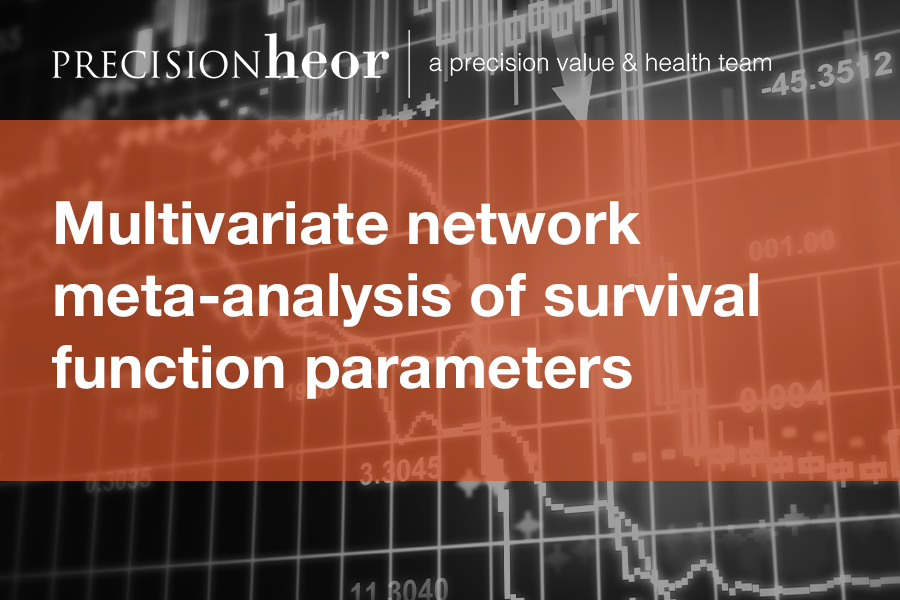 Multivariate network meta-analysis of survival function parameters
Multivariate network meta-analysis of survival function parameters
Shannon Cope, Keith Chan and Jeroen Jansen present an alternative implementation of flexible NMA models for time-to-event outcomes with a two-step approach using common survival distributions such as exponential, Weibull, Gompertz, log-normal, and log-logistic distributions. This approach provides an evidence synthesis framework for time-to-event outcomes grounded in standard practice of parametric survival analysis that uses the exact event and censor times.
Cell & Gene Therapy
 Considerations for Internal Versus External Manufacturing for Developing Cell and Gene Therapies
Considerations for Internal Versus External Manufacturing for Developing Cell and Gene Therapies
Hosted by Informa Pharma Intelligence, this panel discussion will provide key inputs to consider when choosing between a make vs. buy, to scale-up manufacturing internally or look to an external supplier like a CDMO. We will hear from industry experts on the state of the advanced therapy industry, the investment that is pouring into advanced therapies, why manufacturing is such a critical component, various approaches to the build or buy decision and advantages and challenges of the decision.
 How Cell And Gene Therapies Are Reshaping Commercializing Strategies
How Cell And Gene Therapies Are Reshaping Commercializing Strategies
Francis Pang, Ramesh Arjunji, and Jeremy Schafer will share lessons learned from prior launches and discuss how cell and gene therapies are reshaping commercializing strategies. Some of the topics explored will be tensions between cost-effectiveness and affordability, evidence generation strategies and development, and communication to payers and health technology appraisal organizations.
–
 Planning Successful Studies for Cell and Gene Therapy
Planning Successful Studies for Cell and Gene Therapy
Join MassBio and Precision for a one-of-a-kind panel discussion with a unique group of experts in cell and gene therapy studies. These pioneers have been involved in multiple programs that led to FDA-approved cell and gene therapies. They will share lessons learned from experience, giving you actionable insights on every stage of a trial—from the lab, to studies, to logistics and biomanufacturing.
–
Social Determinants of Health
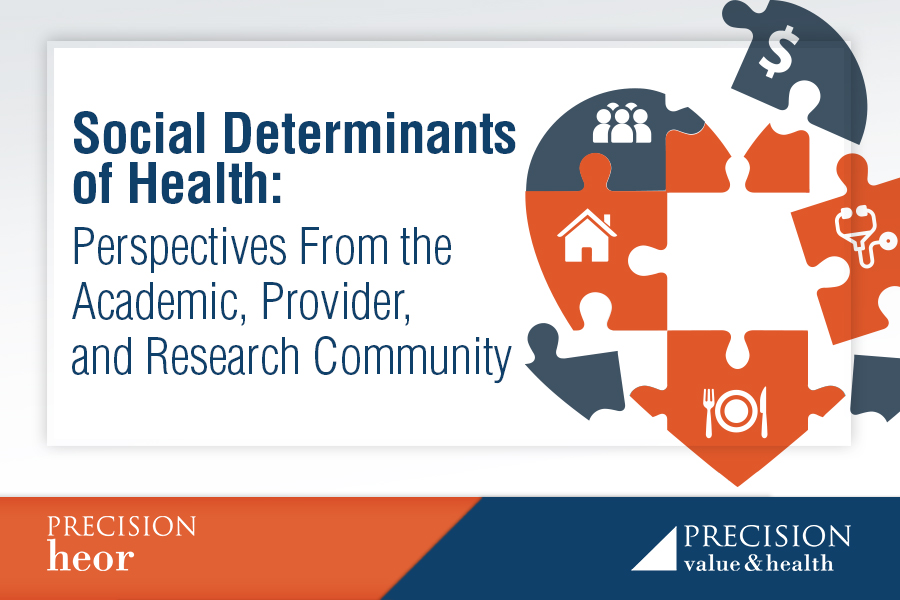 Social Determinants of Health: Perspectives from the Academic, Provider and Research Perspective
Social Determinants of Health: Perspectives from the Academic, Provider and Research Perspective
In the first of Precision Value & Health’s two-part series focusing on Social Determinants of Health (SDOH), PRECISIONheor’s Suepattra May-Slater and Joanna MacEwan join scientific experts Katherine Batt, Dennis Scanlon and Neil Weissman explore how SDOH has re-emerged as a critical factor that inform treatment planning, care delivery, health policy, health outcomes and value. Moderated by Precision’s Ross Maclean.
–
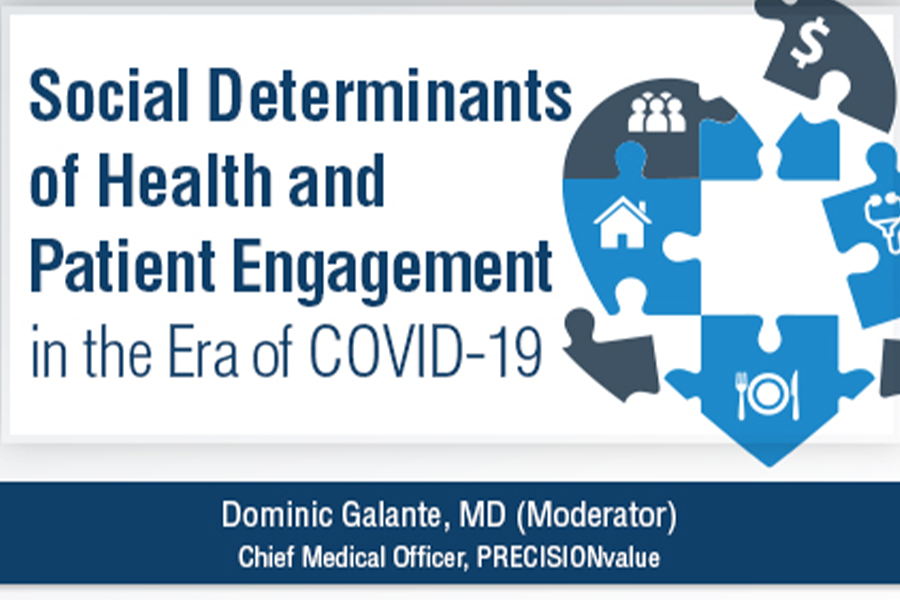 Assessing and Addressing Social Determinants of Health During a Pandemic
Assessing and Addressing Social Determinants of Health During a Pandemic
On December 2nd at 1:00pm ET, our colleagues at PRECISIONvalue will present part two in Precision Value & Health’s SDOH webinar series—addressing collaborative patient engagement and how styles of communication, analytics, telemedicine and PHM are tackling social risks and engaging patients in the pandemic/infodemic era. This webinar will feature Precision’s Maureen Hennessey and Pam Caputo alongside experts Trenor Williams, Prentiss Taylor and Simita Mishra. Moderated by Precision’s Dominic Galante, don’t miss this informative perspective on SDOH.
–
 Steps Health Professionals Can Take to Reduce Inequality in Health Outcomes
Steps Health Professionals Can Take to Reduce Inequality in Health Outcomes
In the American Journal of Managed Care (AJMC), Jason Shafrin and Meena Venkatachalam explain that expanding traditional value frameworks to include inequality and factors that contribute to this is the first step to addressing disparities in health outcomes. After reading the article, also check out the expanded, follow-up coverage of this topic in a special video interview with Jason and Meena, conducted by AJMC’s editor Matthew Gavidia.
–
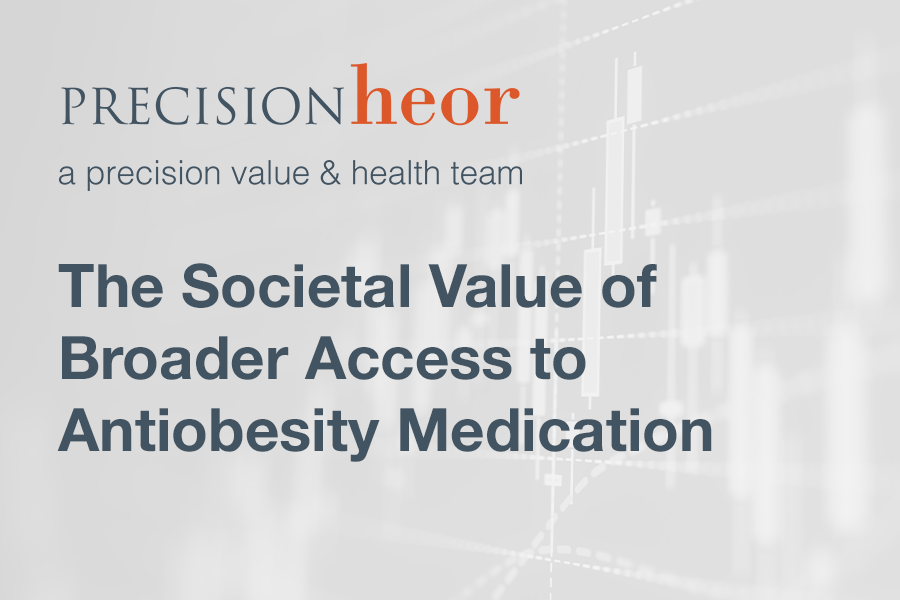 The Societal Value of Broader Access to Antiobesity Medication
The Societal Value of Broader Access to Antiobesity Medication
Precision’s Emma van Eijndhoven and Jim Baumgardner were among the authors who quantified the value to society of more open access to anti-obesity medications (AOM) for eligible adults for whom diet and lifestyle modification are insufficient.
Staff Feature

Meet Hema N. Viswanathan, BPharm, MS, PhD, Vice President at PRECISIONheor
Hema N. Viswanathan, Vice President, is a health economist and outcomes researcher with 15 years of industry experience. Dr. Viswanathan’s interest in studying pharmacy and in the pharmaceutical industry was largely shaped by the environment she grew up in at Ciba-Geigy’s (later Novartis) state-of-the-art research center and campus in Mumbai, India, where her father was a senior scientist trained in organic chemistry. Dr. Viswanathan found the world of drug discovery fascinating at an impressionable age, given the exposure to acclaimed basic science researchers trained around the world often engaged in interesting scientific discussions. While in pharmacy school at the University of Mumbai, she grew interested in marketing and health economics, which led her to join the graduate program in Pharmacy Administration at the University of Illinois at Chicago College of Pharmacy. The M.S. program introduced her to a wide variety of disciplines ranging from advanced behavioral pharmacy to managed care and pharmacoeconomics. She gained an appreciation for qualitative research and the importance of giving voice to the patient’s perspective, which served as the foundation for gaining expertise later in the development of patient reported outcome (PRO) measures.
An internship at Abbott, North Chicago during which she was involved in projects on HIV epidemiology and health economics to support the launch of Kaletra® solidified her interest in the pharmaceutical industry. Dr. Viswanathan then joined Purdue University’s School of Pharmacy for a doctoral degree in Pharmaceutical Economics and Marketing. The interdisciplinary nature of the program was immensely helpful, as it provided exposure to research methods, epidemiology, psychometrics, economics, statistics, and courses including competitive strategy at the Krannert School of Management. At Purdue University, Dr. Viswanathan was awarded the Jenkins-Knevel Award for Excellence in Research and the Albert and Anna Kienly Award for Excellence in Teaching in 2005.
Dr. Viswanathan joined Amgen in 2005 where she held positions of increasing responsibility within Global Health Economics for over 10 years. During this time, Dr. Viswanathan supported product launches and evidence generation activities for pipeline and marketed assets. As Director, Inflammation Pipeline Lead, she led initiatives within cross-company partnerships including a collaboration with Genentech on the development of PRO measures for FDA qualification. At Amgen, she also gained affiliate experience across key European markets supporting the development of reimbursement submissions for oncology launches within the HTA Center of Excellence. Dr. Viswanathan served as Executive Director, Global Therapeutic Area Head for CNS, Neuroscience within Global Health Economics and Outcomes Research at Allergan from 2016 to 2020 and most recently, provided leadership for health economics activities in support of the launch of UbrelvyTM in early 2020. The opportunity to work with a group of talented researchers and utilize her industry experience led her to join PRECISIONheor in August 2020. In her current role at PRECISIONheor, Dr. Viswanathan works very closely with Evidence Synthesis team members and oversees the real world evidence team based in Boston.
Over the years, Dr. Viswanathan has led health economics teams to inform clinical development programs, payer strategies, and support launch readiness and execution. She has developed and executed global value evidence generation strategies in multiple therapeutic areas including neuroscience, hematology, oncology, osteoporosis, psoriasis, ulcerative colitis, and Crohn’s disease. Dr. Viswanathan’s research experience encompasses retrospective and prospective observational research, development and validation of PRO instruments to support labeling, and economic modeling. Dr. Viswanathan is widely published in peer-reviewed journals including Quality of Life Research, Cancer, Osteoporosis International, Contemporary Clinical Trials, Journal of Managed Care Pharmacy, Cephalagia, Headache, and American Journal of Managed Care.
Dr. Viswanathan has a passion for drug development and commercialization and enjoys working collaboratively with teams to identify evidence gaps, shape access strategies, inform endpoint selection in clinical trial programs, and design compelling HEOR studies. Dr. Viswanathan greatly values empowering teams to realize their full potential. Dr. Viswanathan lives in Irvine, California and in her spare time, enjoys walking, relaxing with family, practicing yoga, and learning Indian classical dance.
Upcoming webinar: Using HEOR Methods to Reduce Health Inequalities
Current social and political events have brought renewed attention to the levels of systemic inequalities faced by millions of minorities in the United States and around the world. Adding to the discussion, Precision will explore how innovative health economic and outcomes (HEOR) methods can be leveraged to quantify the full value new treatments that improve health outcomes for underserved communities.
Moderated by Precsion’s Kelly Wilder, EVP, Strategic Business Development, PRECISIONheor’s Jason Shafrin, PhD, and Meena Venkatachalam, MSc, will discuss their recently published blog in Health Affairs addressing how novel methods such as Multicriteria Decision Analysis and Distributional Cost-Effectiveness Analysis can be used to expand traditional value frameworks, offering the potential to reduce health gaps between social and economic subgroups.
Following the discussion there will be a live Q&A.
—
Upcoming webinar: A Novel Method to Improve Validity and Relevance Of Indirect Comparisons and Network Meta-Analysis
Indirect comparison and network meta-analysis (NMA) of clinical trials are used to estimate relative treatment effects between competing interventions, however these methods may lack validity if there are differences in patient populations between studies. If individual patient data (IPD) are available for all included studies then an IPD-level network meta-regression is the gold standard approach.
However, frequently IPD are only available for one or a subset of studies. Available methods in this case include matching-adjusted indirect comparison (MAIC), simulated treatment comparison (STC), and network meta-regression. However, these methods have known limitations which limit their use in practical evidence scenarios.
This webinar provides an introduction to a novel method, called multilevel network meta-regression (ML-NMR). The method addresses several limitations with current methods, including synthesizing networks of any size and availability of IPD or aggregate studies, and – crucially for decision-making – producing estimates in any target population of interest.
This 1-hour webinar will begin with presentations by Jeroen Jansen and David Phillippo (45 minutes), followed by a 15-minute interactive Q&A session.
After participation, you will:
- Understand the principles of ML-NMR
- Appreciate when ML-NMR has benefits over other indirect comparison methods, such as MAIC and STC
- Recognize the implications for future health technology assessment (HTA) submissions
This webinar will benefit those involved in preparing HTA submissions that utilize indirect comparison methods
—
Now available on-demand! Evidence Challenges and Synthesis Solutions for Health Economic Modeling
The desire to make novel treatments available to cancer patients as soon as possible has led to a growing number of clinical trials designed for regulatory purposes. These pose challenges to understanding the economic value due to gaps in the evidence base.
Moderated by PRECISIONheor’s Ross Maclean, this webinar provides an overview of innovative approaches to synthesize the available evidence and knowledge to improve the credibility of cost-effectiveness models for cancer treatment. The concepts that will be discussed are also applicable to other disease areas.
The webinar will be followed by an interactive Q&A session.
After participation, you will:
- Understand how we can align clinical evidence synthesis with cost-effectiveness modeling in oncology. This comprehensive integrated approach can improve model credibility and project efficiency
- Appreciate the relevance of advanced evidence synthesis methods to incorporate novel elements of value (“hope” and “physical and financial risk reduction”)
- Recognize the value of expert opinions obtained with formal elicitation methods to improve health economic models
Join us in this webinar and learn how to utilize innovative approaches and models to improve the credibility of cost-effective models for disease treatment!
—
PRECISIONheor’s Thought Leadership
Our recent collection of thought leadership features scientific publications from Precision authors Kathy Lang, Ross Maclean, Jason Shafrin, Meena Venkatachalam, and more!
—–
COVID-19 Pandemic Vindicates the ISPOR Value Flower
What is the right price for a new treatment for COVID-19 and why the “value flower” model can more accurately value treatments which have a transformational impact on the lives of not only of patients, but also caregivers, employers, and broader society.
——
According to the Centers for Disease Control and Prevention (CDC), while African Americans represented 13 percent of the US population, as of May 30, 22 percent of COVID-19 patients were black. Furthermore, as of March 30, 33 percent of hospitalized COVID-19 patients were African American. These health disparities were well known before the COVID-19 pandemic; life expectancy for African Americans in the US is 3.5 years lower than for the American population as a whole. Although there is a universal acknowledgement that health inequalities need to be addressed, the question is “How?”
PRECISIONheor’ Staff Feature: Suepattra May-Slater, PhD
Suepattra May-Slater, Principal Scientist at PRECISIONheor began her career in healthcare research over 20 years ago as a program assistant for an NIH funded Specialized Program of Research Excellence in ovarian cancer at the Fred Hutchinson Cancer Research Center in Seattle. The multidisciplinary program was focused on “bench to bedside” translational research, involving molecular biologists, immunologists and public health scientists, seeking to identify ways to detect ovarian cancer early, and improving therapies for patients. A novel aspect of the program was inclusion of a patient advocacy arm – one of the first of its kind in the country in ovarian cancer – to ensure the patient perspective was infused throughout the work, but a challenge given that patients and researchers, while sharing the same goals – may not always speak the same language.
This formative experience helped shape a longstanding interest to develop, implement, and optimize strategies for collaborating with patient stakeholders and ensuring patient centric initiatives in carrying out health economics and outcomes research across therapeutic areas. As a Master in Public Health student concentrating on Health Services Research at the University of Washington, Dr. May-Slater conducted field research in Senegal West Africa to understand how to conduct screening for and educate women about breast cancer in a lower income country lacking the infrastructure we are accustomed to in wealthier nations. Dr. May-Slater continued her graduate studies in the joint program in Medical Anthropology at the University of California Berkeley and San Francisco, honing her expertise in qualitative data collection methods and analyses, and continuing to investigate how patients experience illness and healthcare.
At Precision, Dr. May-Slater conducts a range of primary data collection projects incorporating mixed-methods across a number of therapeutic areas and topics ranging from oncology to treatment decision making, patient engagement, social determinants of health, patient reported outcomes, and implementation sciences approaches to adoption and uptake of therapeutic interventions. Her work at Precision includes conducting focus groups and developing surveys to investigate clinician and patient preferences for treatment, understanding the context in which decisions are made, as well as designing and conducting in-depth interviews with decision makers across the health policy and care delivery landscape, within the US and globally.
Dr. May-Slater’s research has been published in leading medical journals and presented at major conferences including Health Affairs, Medical Decision Making, ASCO, and ISPOR. She is a co-author on 20 peer-reviewed publications and over 50 conference presentations, including most recently a publication in Medical Decision Making Policy and Practice presenting findings from a mixed methods study investigating the value of progression free survival in metastatic breast cancer:
MacEwan, J. P., Doctor, J., Mulligan, K., May, S. G., Batt, K., Zacker, C., Lakdawalla, D., & Goldman, D. (2019). The Value of Progression-Free Survival in Metastatic Breast Cancer: Results From a Survey of Patients and Providers. MDM policy & practice, 4(1), 2381468319855386. https://doi.org/10.1177/2381468319855386
Dr. May-Slater holds a PhD from the Joint Program in Medical Anthropology at the University of California, Berkeley & San Francisco; and from the University of Washington earned both an MPH in Health Services and a BA in International Studies. Outside of work, Suepattra enjoys trying out new recipes in the kitchen, reading historical fiction, occasionally riding her Peloton and planning vacations with her husband and their twin girls.








